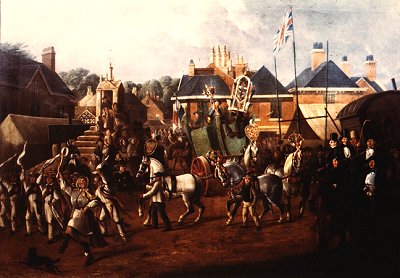The Rush-Bearing at Ambleside
Letitia Elizabeth Landon
Summer is come, with her leaves and her flowers—
Summer is come, with the sun on her hours;
The lark in the clouds, and the thrush on the bough,
And the dove in the thicket, make melody now.
The noon is abroad, but the shadows are cool
Where the green rushes grow in the dark forest pool. •
We seek not the hedges where violets blow,
There alone in the twilight of evening we go;
They are love-tokens offer'd, when heavy with dew,
To a lip yet more fragrant—an eye yet more blue.
But leave them alone to their summer-soft dream—
We seek the green rushes that grow by the stream.
Away from the meadow, although the long grass
Be fill'd with young flowers that smile as we pass;
Where the bird's eye is bright as the sapphires that shine
When the hand of a beauty is deck'd from the mine.
We want not their gems, and we want not their flowers,
But we seek the green rush in the dark forest bowers.
The cowslip is ringing its fairylike chime,
Sweet bells, by whose music Titania keeps time:
The rose bush is cover'd with cups that unfold
Their petals that tremble in delicate gold.
But we seek not their blossoms in garlands to blend,
We seek the green rush where the willow trees bend.
The green rush, the green rush, we bear it along
To the church of our village with triumph and song;
We strew the cold chancel, and kneel on it there,
While its fresh odours rise with our voices in prayer.
Hark the peal from the old tower in praise of it rings,
Let us seek the green rush by the deep woodland springs.
Author's Note:
* In the olden time, when the churches were strewn with rushes, the ceremony of changing them was a yearly religious festival. The custom, once universal, now lingers only in some of the remote northern districts. There, bunches of rushes, gayly ornamented, attended by banners and music, are still borne in triumph by the young people of the village. Last remains of that pastoral poetry which once characterized "merrie England."
